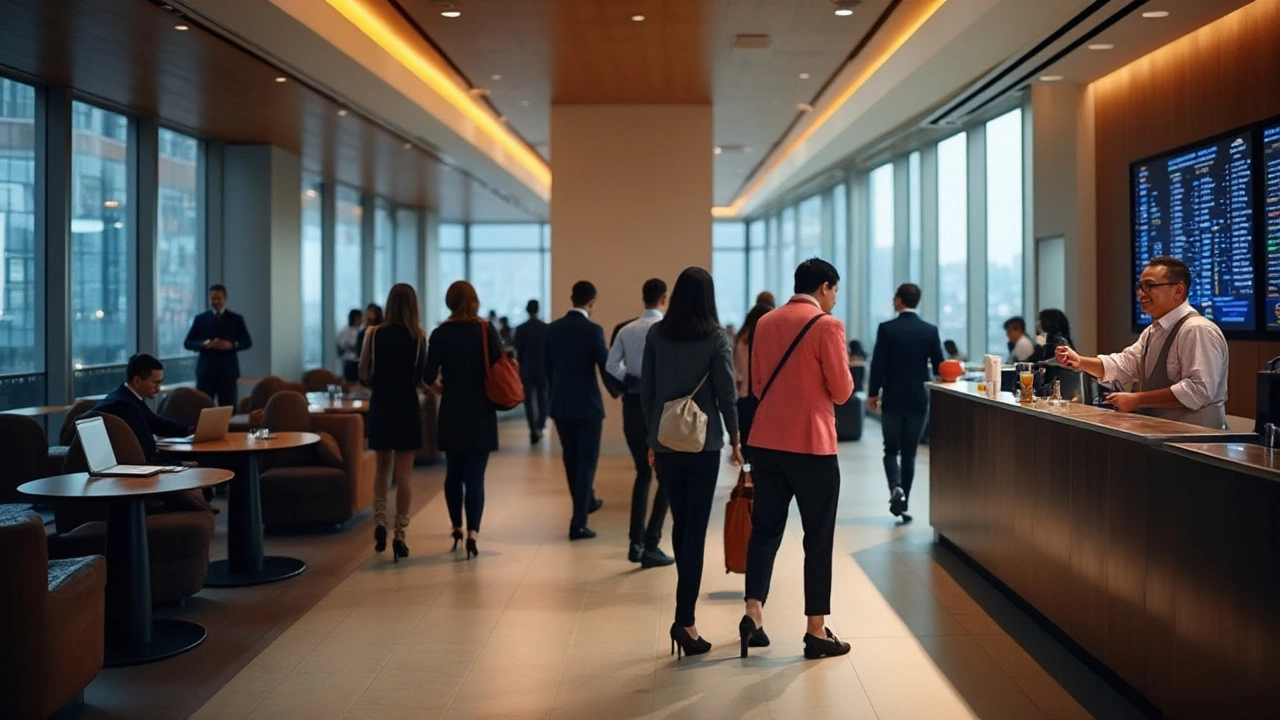Exploring the Distinctive Worlds of Business Hotels and Boutique Hotels
 Dec, 15 2024
Dec, 15 2024
In a world where travel has become an integral part of both business and leisure, choosing the right place to stay can significantly impact your experience. Two popular types of accommodations, business hotels and boutique hotels, offer distinct services and atmospheres that cater to different traveler needs.
For those whose journeys are largely work-focused, business hotels provide all the essentials, from reliable high-speed internet to convenient meeting spaces. These hotels are designed to ensure that guests can maintain productivity while away from their usual office setup.
On the other hand, boutique hotels stand apart with their charm and individuality. Known for their artistic flair and personalized service, these hotels offer a more intimate and unique environment. The experience is often enriched with a touch of local culture and distinctiveness in decor and ambiance.
Understanding the nuances between these two options will help in selecting accommodation that suits your purpose and preferences, enhancing your travel experience, whether it's all about the job or enjoying a getaway with a personal touch.
- Defining Business Hotels
- Unique Features of Boutique Hotels
- Target Audience and Guest Experience
- Location and Atmosphere
- Making the Right Choice for Your Stay
Defining Business Hotels
Business hotels are strategically crafted to cater to professionals traveling for work-related purposes. These accommodations are equipped with amenities that ensure convenience and productivity, allowing guests to maintain a seamless workflow even when away from their offices. Such hotels, found predominantly in busy city centers and near airports, are designed with a focus on functionality and efficiency. The emphasis is on providing quick and easy access to essential services, contributing significantly to the ever-evolving needs of the modern corporate traveler.
At the core of a business hotel’s offerings are services like high-speed wireless internet, comprehensive business centers, and meeting facilities. These features are vital to travelers who often need to host presentations or coordinate with remote teams across different time zones. They are likely to have conference rooms equipped with cutting-edge audiovisual technology, catering to the demands of elaborate business meetings.
Another hallmark of a business hotel is their well-structured loyalty programs that reward frequent stays. These programs enhance customer retention by offering privileges such as room upgrades, complimentary breakfasts, and access to exclusive lounges. According to a report by STR Global, approximately 70% of business travelers rely on hotel loyalty programs when making accommodation choices, illustrating their significance.
Service availability around the clock is another defining feature. Business travelers often face varying schedules, so having a 24-hour reception desk and room service available can be incredibly beneficial. These factors provide the flexibility a traveler might require when adjusting to new time zones or fitting in work between meetings. Many business hotels also include on-site dining with menu options catering to fast-paced schedules, or health-conscious choices for regular travelers who maintain their fitness regimes.
If you imagine a day in such a hotel, it might start with an energizing workout in a state-of-the-art gym followed by a nutritious breakfast buffet offering both international and local dishes. The staple feature often includes access to an executive club or lounge where professionals can relax or hold informal meetings in a plush setting with complimentary beverages. Not moored solely in serious decor, these lounges often exude a relaxed feel to counterbalance the intensity of work commitments.
"Understanding the needs of our business clientele, we've integrated cutting-edge conference technologies and seamless connectivity," said a spokesperson from a leading hotel chain, referencing their commitment to accommodating the business community effectively.
In recognizing the needs of business hotels, easy check-ins and check-outs are prioritized. With business travelers often running on tight schedules, they benefit from the ability to quickly settle in or leave without hassle. Digital processes or express services are frequently adopted to minimize wait times and streamline these procedures, making them hallmarks of efficient service provision.
Consistently, these features amalgamate to explicate the purposeful design of business hotels, ensuring that professionals can achieve maximum productivity while experiencing a stress-free stay. They remain a vital resource for the working traveler, offering peace of mind that all their professional needs will be met with exemplary service.
Unique Features of Boutique Hotels
Boutique hotels have long been captivating travelers who seek more than just a place to rest their heads. These establishments, often set in chic urban locations or picturesque rural getaways, are defined by their individuality and character. Unlike the uniformity often found in large hotel chains, boutique hotels offer a distinctive personality shaped by unique design elements, bespoke furnishings, and innovative architecture. This individuality is not just cosmetic but is deeply embedded in the ethos of providing an exclusive experience to each guest. Such personalized experiences begin from the moment one enters the lobby, often greeted by eclectic decor that tells a story of its own, reflecting local culture or a particular art movement.
One of the key elements that set boutique hotels apart is their emphasis on intimate settings and personalized service. Typically featuring a limited number of rooms, often fewer than 100, these hotels ensure that each guest receives meticulous attention. The staff often know guests by name and are adept at anticipating needs, creating a warm and welcoming atmosphere that larger establishments may struggle to replicate. This tailored service extends to unique amenities which may include curated local experiences, personalized room service menus, and exclusive spa treatments tailored to individual preferences.
An often underestimated aspect of boutique hotels is their commitment to the local community. Many boutique establishments integrate local art, crafts, and produce into their offerings, providing a platform for regional artists and suppliers. This not only enriches the guest experience by offering an authentic taste of local culture but also supports sustainable tourism practices. Some hotels even hold events or exhibitions featuring local artists, adding an educational dimension to your stay. As noted by The New York Times, “Boutique hotels are perfect microcosms of experiencing the local culture without ever leaving the premises.”
Boutique hotels are perfect microcosms of experiencing the local culture without ever leaving the premises.
Innovation is another hallmark of boutique hotels. From tech-savvy rooms that allow guests to control lighting and temperature via mobile apps to environmentally conscious initiatives like using solar power or locally sourced building materials, these hotels are often at the forefront of the hospitality industry’s latest trends. Boutique hotels may surprise you with a rooftop garden or a pop-up dining event featuring renowned local chefs. These creative endeavors not only attract a certain clientele eager for fresh experiences but also contribute to the hotel’s unique allure.
Highlighting the diversity of boutique hotels can be remarkably insightful. A Parisian boutique hotel might focus on offering romantic, art nouveau-styled rooms overlooking the Seine, while a beachfront boutique resort in Bali might emphasize tranquil interiors with touches of traditional Balinese artistry. This variety ensures that whether you’re chasing the bohemian vibes of New York’s Lower East Side or the laid-back luxury of a vineyard retreat in Tuscany, there’s a boutique hotel that feels tailor-made for you. This commitment to providing a unique experience cultivates a loyalty among travelers that often see guests returning to the same hotel or seeking out similar experiences in new destinations.

Target Audience and Guest Experience
The target audiences for business hotels and boutique hotels may overlap, but each caters to distinct needs and preferences. Business hotels are tailored to meet the demands of corporate travelers. These guests often require efficient, no-fuss services that support their work goals. Amenities like business centers, conference rooms, and express check-in options are staples. These hotels focus on functionality, allowing seamless transitions between work and rest. Such establishments are often situated in bustling city centers, minimizing commute times to local offices and event venues. Guests typically appreciate clear, direct services that prioritize their tight schedules. The structured environment ensures competence and reliability, which many business travelers find indispensable during their frenetic trips.
In contrast, boutique hotels attract those seeking a more personalized experience. These travelers, often leisure guests, look for a unique touch that reflects the local culture and flair. Boutique hotels offer more than just a place to sleep; they promise an immersive experience, often featuring bespoke interiors, curated art collections, and locally-sourced gourmet meals. Each detail, from the room's decor to the lobby's scent, is thoughtfully crafted to deliver a distinct atmosphere. Guests value the individual attention they receive, enjoying services that can be tailored to their personal preferences. Unlike their larger counterparts, boutique hotels typically boast a more intimate guest capacity, fostering a sense of community and exclusive access to amenities. Here, travelers find a sanctuary from the hustle, a place that feels special and often mirrors their taste or a desire for new experiences.
When choosing between the two, consider the purpose of your trip and personal preferences. If the need centers around convenience and work, a business hotel might check all the right boxes. Meanwhile, if leisure and unique experiences are high on the agenda, a boutique hotel offers a world of personalization and charm. Interestingly, a recent survey reported that 70% of guests who choose boutique hotels do so because of the unique decor and ambiance, highlighting how setting and style significantly impact travel experiences. Business travelers, in contrast, emphasize the importance of facilities like high-speed Wi-Fi and 24-hour room service. Ultimately, knowing what you need from your stay helps in making the right choice, enriching your travel experience whether it leans towards the business or personal spectrum. As you plan your next adventure or work trip, weigh these factors to ensure your stay complements your journey's goals and pleasures.
Location and Atmosphere
The location and ambiance of a hotel play a crucial role in defining the type of stay you can expect, whether at a business hotel or a boutique hotel. Business hotels are often strategically placed in key urban areas, typically in proximity to business hubs, airports, or convention centers. This positioning allows busy corporate travelers quick access to the crucial places they need to be, minimizing travel times and maximizing efficiency. The location choice is deliberate, aimed at providing convenience and saving time for travelers on tight schedules.
In contrast, boutique hotels are frequently tucked away in charming locations that resonate with the local culture and environment. You might find them nestled in the heart of a historic district or along a scenic coastline where the atmosphere is more relaxed and imbued with the essence of the surrounding area. This unique setting is a big part of their allure, offering guests memorable experiences that extend beyond the hotel walls. The emphasis on individuality means each boutique hotel has its signature style, leaving guests with enchanting memories of both the place and its surroundings.
According to the Ritz-Carlton's guide to hospitality, "Staying in a boutique hotel is about the immersion of oneself into the vibe of the location, where every corner tells a story specific to its neighborhood."
Business hotels often exude an efficient, modern ambiance with interior designs that are sleek and functional. These establishments focus on pragmatic luxuries like abundant meeting spaces, state-of-the-art technology, and comforts that align with the business traveler's routine. From spacious lobbies conducive to brief meetings to dedicated business centers, these hotels are built to foster productivity.
On the other hand, the atmosphere in a boutique hotel is intimate and personal. Each room might be uniquely decorated, drawing inspiration from local art and history, providing a narrative that captures the region's spirit. The smaller scale of these hotels often means a more personalized service, where hotel staff members might remember your name or preference, creating an inviting sense of familiarity.
Comparing Atmospheres: The Feel of Each Stay
An element that distinctly separates the business hotel from its boutique counterpart is the guest interaction experience. In a business hotel, the environment is geared towards ensuring everything runs smoothly and effectively. Technology is seamlessly integrated, Wi-Fi is robust and reliable, and the ambiance often buzzes with the energy of transactions and negotiations. In these settings, leisure is more scheduled, enjoyed during designated breaks or as an afterthought to a day of meetings.
Conversely, a stay in a boutique hotel is more about savoring the moment. The settings are designed to encourage relaxation and exploration. Perhaps you'll find a cozy corner in the beautifully adorned lobby to sip a craft cocktail, or maybe you'll indulge in a gourmet breakfast featuring locally sourced ingredients. These elements of surprise and delight are what often endure in the memories of guests after their stay in a boutique hotel.

Making the Right Choice for Your Stay
When it comes to choosing between a business hotel and a boutique hotel, there are several key factors to consider that will help ensure your stay is comfortable, convenient, and memorable. The right choice often depends on your specific needs and priorities during your trip. Both types of hotels offer unique benefits, but understanding what sets them apart can guide your decision-making process.
If your travels are primarily work-related, a business hotel might be your go-to option. These establishments are tailored to create a productive environment for professionals on the move. Typically located in bustling business districts or near major airports, business hotels offer quick access to important meetings and events. Look for features such as 24-hour business centers, meeting and conference rooms equipped with the latest technology, and high-speed internet connectivity. For those long days, these hotels often provide various in-room workstations designed to resemble an office, so you can stay on top of your agenda without missing a beat.
It's essential to weigh the convenience of accessibility to business hubs against your need for downtime. The efficient nature of a business hotel may sometimes lack the personal touches and character found in boutique hotels. Yet, many business travelers have reported that practical amenities, like shuttle services and express check-ins, add significant value to their stay's efficiency. "In today's fast-paced business world, the right hotel not only supports productivity but can also offer a moment of respite," observed Hospitality Net in a recent article discussing trends in business travel accommodations.
In contrast, if your journey seeks a more intimate and culturally immersive experience, boutique hotels are likely to capture your heart. These hotels often feature stunning design elements and décor that reflect the local spirit, allowing guests to connect with their surroundings in a more profound way. Ideal for travelers who enjoy a personalized and warm atmosphere, boutique hotels provide bespoke services, including curated local experiences and chef-led dining.
A boutique hotel might be nestled in a historic building or uniquely themed, giving each stay its own story. Whether it's artfully crafted interior design with local artistry or perhaps a residence renovated to enhance its unique character, these details invite you into a world that's distinctively different from mainstream accommodations. Moreover, the smaller size of boutique hotels enables staff to deliver more personal service, remembering your name and preferences to enhance your experience.
Deciding between these two hotel types also hinges upon the nature of your visit. Consider creating a list to clarify what matters most for your specific trip. If your priority list includes consistent productivity and quick logistics, lean towards a business hotel. However, if your trip allows for indulgence in atmosphere and meticulous service, a boutique stay may provide the change of pace you need. Ultimately, understanding what you value during your travel will guide you to a perfect choice, ensuring that the hotel you select complements the purpose of your travel magnificently.